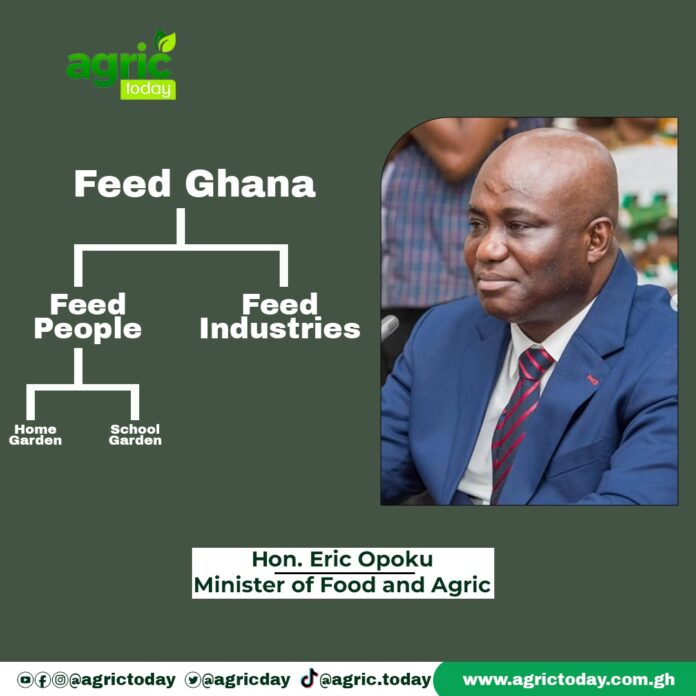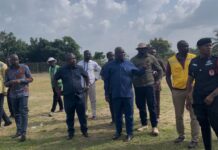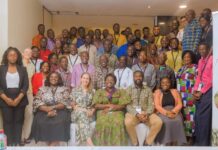To revive and revamp the country’s economy, the Government of Ghana together with its stakeholders have launched a project that would roll out the 24-hour for economic growth and development.
The project “Irrigation for Wealth Project” aimed at reducing dependency on seasonal rainfall, which is often unpredictable and negatively affects farmers’ yields and to boosting food production, feed the local industries and improving agricultural activities in the country.
During the launch at Accra on February 13, 2025, the Minister for Agriculture, Hon. Eric Opoku, explained that the project’s primary goal is to provide sustainable irrigation facilities to support Ghanaian farmers in overcoming seasonal challenges in agriculture.
This project is part of the government’s broader strategy to transform the agricultural sector, with a focus on ensuring food security and enhancing the economic benefits of farming.
The Irrigation for Wealth project is expected to be implemented over the next twelve months and will cover eight regions across Ghana. The designated regions include Volta, Oti, Central, North East, Northern, Savannah, Upper West, and Upper East.
In line with the government’s vision, the regional ministers from these areas have been assigned to spearhead the implementation of the initiative. They are expected to engage stakeholders in their respective regions to ensure smooth coordination and execution of the project.
At the meeting with the 8 regional ministers, Hon. Eric Opoku emphasized that Phase One of the project will require the allocation of ten thousand hectares of land for irrigation purposes.
The government’s vision for the initiative aligns with the Agric for Economic Transformation agenda, which aims to increase the resilience and productivity of the agriculture sector.
The Minister assures that the areas selected for the project have been identified as potential irrigation zones for a long time.
He further noted that the discussions with local chiefs have been finalized to ensure the initiative’s smooth rollout. However, he highlighted that the specific type of irrigation facilities to be installed in each region will be determined after a detailed field visit by experts who will assess the requirements for each area.
The nature and scale of the irrigation systems to be implemented will depend on the unique conditions of each region, as each one has specific land areas that need to be catered to under the Irrigation for Wealth Project.
The Minister elaborated on the current challenges that farmers face due to Ghana’s seasonal rainfall patterns, stating that “Farming in Ghana is seasonal. It’s seasonal because it is rainfall we depend solely on. The weather is not that favourable.”
He reiterated that farmers will be the primary beneficiaries of the investment, and the government intends to “reset their culture” to ensure consistent agricultural production.
According to Ministry records and reports from previous administrations, only 1.6% of the 1.9 million hectares of land in the country is currently irrigated. This is a stark contrast to the West African average, which stands at 13.9%.
Hon. Minister pointed out that Ghana is significantly lacking behind in terms of irrigation infrastructure, and urgent investments are needed to bridge the gap and boost agricultural productivity.
“We have to push a lot of resources into irrigation so that we can ensure all year production. Our concern is to increase food production so that everyone of you can be fed. We want to produce food to feed our country and the rest of West Africa. We can do it,” he stated confidently.
The minister also questioned why Ghana continues to import food at a cost exceeding $2 billion annually. This heavy reliance on food imports, he argued, places unnecessary strain on the country’s foreign exchange reserves and worsens the exchange rate challenges, further affecting businesses and increasing unemployment.
He stressed that with the right investment in irrigation and agricultural infrastructure, Ghana could reduce its reliance on food imports and improve its self-sufficiency.
Although the exact cost of the Irrigation for Wealth initiative has not yet been disclosed, Mr. Opoku assured the public that the financial details would be revealed during the 2025 budget statement.
He clarified that the project is still in its design phase, and the final cost will depend on the quantities and specifications determined after the field assessments by experts. “We have now commissioned the team to go to the field to finalize the designs. It would be premature for me to indicate the exact cost at this stage. However, once the designs are finalized and the budget approved, the contractors will be engaged to commence the project immediately,” Mr. Opoku stated








